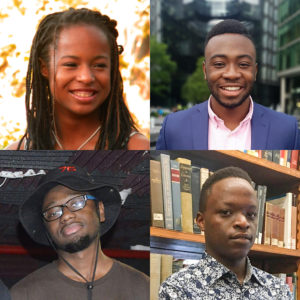
From top left (clock-wise), Jordan Otto, ’20, David Ebhomielen, ’18, Victor Yegon, ’20, and Donterrius Walker, ’19, all saw the ‘Black Panther’ movie in theaters. ‘Black Panther’ has so far made $242.1 million in the box office. (Designed by Sam Henry/B&W Staff)
Butterfly McQueen uttered the classic line, “I don’t know nothin’ ‘bout birthin’ babies,” 79 years ago when she played a simple slave girl in “Gone with the Wind,” one of the few roles available to black actresses at the time.
Hattie McDaniel became the first African American to win an Oscar in 1940 for her portrayal of Mammy, the head slave in “Gone with the Wind.”
Because of Atlanta’s segregation laws, neither actress was allowed to attend the premiere of “Gone with the Wind,” the film that launched them to national stardom.
Eight decades later, Marvel Cinematic Universe produced its first predominantly black superhero film, “Black Panther,” starring Chadwick Boseman.
The movie, directed by Ryan Coogler, earned $242.1 million in the box office and is the second best four-day opener to date. “Black Panther” tied with “Captain America: Civil War” for the second-highest-earning opening night in Marvel history, making $25 million.
“Black excellence is finally being exposed in ‘Black Panther’ and we’re finally getting recognized,” Donterrius Walker, ’19, said. “Black superheroes bring courage and build self-esteem, and it’s rare and very influential for younger kids.”
David Ebhomielen, ’18, said the cast itself shows potential for African and African American culture.
“Hollywood is definitely guilty of white-washing roles,” he said.
Ebhomielen said “Black Panther” opened much-needed conversation between Africans and African Americans.
“Unity isn’t always there and it’s not addressed often, especially in the media,” Ebhomielen said. “Because I am from Nigeria, I can say that there is a disconnect in culture. Africans are fortunate enough to know their history, but African Americans don’t have the luxury of knowing their roots. They are more deeply involved in social and civil rights issues, but we recognize injustices as well.”
“Black Panther” payed homage to historic African culture as well.
Kenyan international student Victor Yegon, ’20, said the red robes worn by the female warriors in the movie referenced the Kingdom of Dahomey, which fought with an all-female regiment.
He said the robes are similar to the traditional clothing of two Kenyan tribes, the Maasai and the Turkana.
Walker said he didn’t see the character Erik Kilmonger as the villain in the movie, but instead as an upset character.
“There’s still a lot of issues for people living in America and they didn’t go away just because slavery is over,” Jordan Otto, ’20, said. “Kilmonger brought that up.”
Yegon said even the characters’ accents play a significant role in the movie. He said the people of Wakanda were speaking Xhosa, a South African language.
Walker said “Black Panther” includes hidden messages. He said there is a poster of hip-hop group Public Enemy’s album “It Takes a Nation of Millions to Hold Us Back” on the bookshelf in Kilmonger’s childhood living room in the movie. He said he thought the album title coincided with some of the film’s major themes.
Otto said she appreciated the different natural hairstyles the actresses wore in the film. She said it takes a while to get her hair ready in the morning, and she thought the different styles included in the movie were beautiful.
“I really enjoyed this movie,” Yegon said. “Most people who think of Africa think Africa is about disease, ebola, aids, Safari and Somalia. They don’t realize that Africa has many of its own beautiful cities. The ‘Black Panther’ movie incorporated African culture and futurism. I had set a really high bar before I walked into the theater and the movie lived up to the height.”





Comment policy
Comments posted to The Brown and White website are reviewed by a moderator before being approved. Incendiary speech or harassing language, including comments targeted at individuals, may be deemed unacceptable and not published. Spam and other soliciting will also be declined.
The Brown and White also reserves the right to not publish entirely anonymous comments.
2 Comments
The movie was awesome. As a big comic fan I love how they put the story together. I’m also impressed with how they went straight on about slavery and the experience of people of color. I have zero degrees of separation from this thanks to my amazing niecies. Thanks Brown and White for posting this.
Pete O’Grady ’85
“Walker said he didn’t see the character Erik Kilmonger as the villain in the movie, but instead as an upset character.” The name “Xhosa” comes from that of a legendary leader and King called uXhosa. There is also a fringe theory that, in fact the King’s name which has since been lost amongst the people was not Xhosa, but that “xhosa” was a name given to him by the San and which means “fierce” or “angry” in Khoisan languages. The Xhosa people refer to themselves as the AmaXhosa, and to their language as isiXhosa. Coincidence, probably not. From the comments, much thought went into this movie.
Ebhomielen said “Black Panther” opened much-needed conversation between Africans and African Americans.
“Unity isn’t always there and it’s not addressed often, especially in the media,” Ebhomielen said. “Because I am from Nigeria, I can say that there is a disconnect in culture. Africans are fortunate enough to know their history, but African Americans don’t have the luxury of knowing their roots. They are more deeply involved in social and civil rights issues, but we recognize injustices as well.” So many African viewpoints to consider.
I wonder why there are so many scams coming from Nigeria. Seems to be the African capital of such things. Not political like the communists, seems to be just about the money.